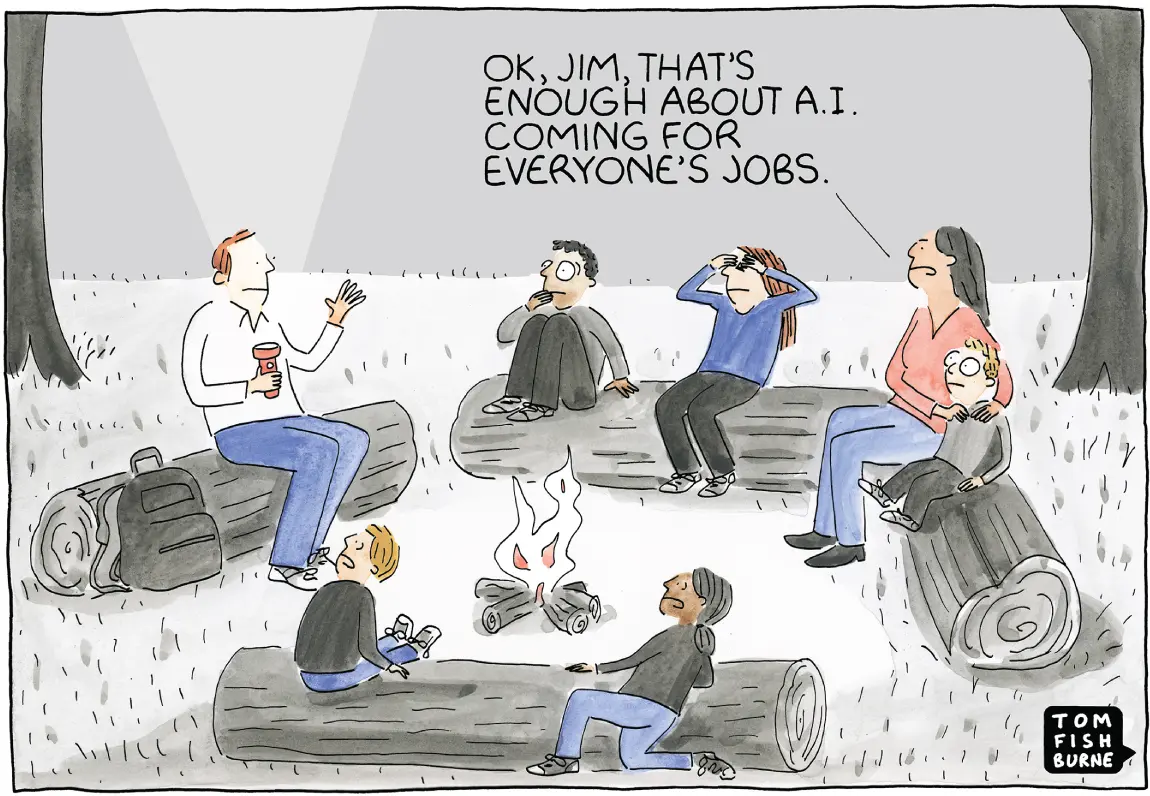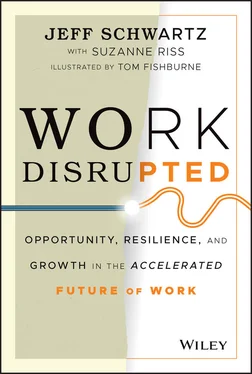Some businesses soared during the pandemic. Instacart, the grocery pick-up and delivery service, hired more than 300,000 full-time employees in one month to meet the increased demand at the start of the pandemic, with plans to hire 250,000 more. 14 However, a far greater number of businesses and individuals had to change direction to survive. Furloughed hotel call center operators found themselves subcontracted to operate state and city call centers. Uber launched a courier service so that drivers who could no longer transport passengers could continue to work by delivering packages, medicine, and pet supplies. 15 Spiffy, the U.S. on-demand car cleaning company, rolled-out a service to sanitize and disinfect facilities and properties. 16
Innovation and experimentation will continue to be lifelines as we transition to a very different world. Author William Gibson reminded us more than 15 years ago that, “The future is already here, it's just not evenly distributed.” 17 An important corollary is that the future comes at us in accelerated bursts. The coronavirus is one such accelerator to the future. We have witnessed similar accelerators in recent years, with the great financial crisis of 2008–2009 and Y2K. The challenge is how we navigate and take advantage of these sudden shifts.

“Are robots really coming for our jobs?” a longtime client asked me in hushed tones, his brow furrowed, his voice filled with anxiety.
His business partner leaned in, reframing his question with another. “Won't new technologies relieve us of all the boring, repetitive tasks so we can focus on more meaningful work?” she suggested in a hopeful tone that quickly grew impatient. “Well, which is it?”
In conversations over the past decade with friends, colleagues, and business leaders about how automation, advanced technologies, and new employment models are transforming the American workplace, the worry has been palpable: “How can we keep up with machines?” they wonder. “What skills do I need to prepare for jobs in 2030?” they ask. “We're going to have a dozen careers, not just one—how's that even possible?” they demand. “I still haven't paid off my student loans for one career.”
The pervasive feeling is that we're standing on the threshold of something powerful, unstoppable, and unknown, much like a giant tidal wave that is going to wash over everything and transform us—how we work, where we work, the work we do, if we work at all. These conversations, more often than not, are characterized by fear. The dizzying advances in robotics, artificial intelligence (AI), digital technology, and new ways of working have created haunting images of a dystopic future world where machines and software can perform most jobs, and human workers are largely unnecessary. Even the acronym FANG, coined in 2013 for the four high-performing tech stocks (Facebook, Amazon, Netflix, and Google), contributes to this conflation of technology and monsters. 18
People are most concerned about whether AI will complement human capabilities or act as a substitute. While some predict nothing short of a job apocalypse, other forecasters focus on the vast potential of new technologies to create greater value for workers and to liberate us so we can leverage our uniquely human capabilities—those enduring human skills that smart machines have not yet mastered, such as problem-solving, creative thinking, complex decision-making, empathy, and managing teams. In this scenario, groups of remote and diverse teams work together, people and machines collaborate, and workers continue to be employed because they explore and master new skills and capabilities throughout their lives.
“In medicine, law, finance, retailing, manufacturing, and even scientific discovery, the key to winning the race is not to compete against the machines, but to compete with machines,” observed authors Erik Brynjolfsson and Andrew McAfee in 2012. 19 MIT's Thomas Malone calls the remarkable power of people and computers working together “superminds.” 20 From finding new cures for diseases to designing new tools and systems that will create new products and new lines of business, the promise of AI and humans working together may be the future.
In the midst of these dramatically different depictions of the future of work—a robot apocalypse versus humanity unleashed—many seek to understand what is different from other periods of great technological advances, where do they fit in, and how can they navigate this landscape without signposts so they can continue to work. For all the hype and headlines about the future of work, guidance on how people can find their way is in short supply. My aim is to provide that guidance.
Innovation and experimentation will continue to be lifelines as we transition to a very different world.
While portions of many jobs will change, and some jobs will likely be eliminated entirely, many more jobs will evolve. When agricultural processes were mechanized in the nineteenth century, some farmworkers lost their jobs, but they ultimately earned more money working in factories. The automation of industrial production displaced factory workers in the twentieth century but they moved into service jobs. What we tend to forget is that rising productivity creates new jobs. Indeed, technological innovation has historically delivered more jobs, not fewer. And the new jobs often required more skills and paid higher wages.
As an economist and business consultant who has spent the past decade immersed in the issues surrounding the future of work, I have explored the topic with innovative thinkers and business leaders wrestling with the opportunities and challenges presented by this changing landscape. I spent half of the past decade based in New York and half in Delhi and Mumbai, working across India and Asia. I have advised companies and government agencies grappling with the mysteries that lie ahead. And I continue to bear witness each day to the dramatic changes taking place at the forefront of some of the largest and most successful businesses in the United States and around the world.
This book offers guidance to individuals, business leaders, and institutions so they can make smart choices. Organizations are poised to shape what ultimately becomes the future of work, as individual workers face broad options regarding how and where they work, as well as the skills and capabilities they want to gain to secure their livelihood. While we appear to welcome consumer technologies in our personal lives—we have managed to master more than 10 versions of smartphones (Apple and Android) since they were introduced in 2007 and 2008, respectively—we are more uncomfortable with tech innovations that will ultimately transform in profound and meaningful ways our work, who does the work, and where work is done. 21
Individuals are searching for ways to continue to contribute their skills, procure value, and have an impact in the marketplace. Employers are facing important choices about whether to use advances in technology to drive efficiency and reduce costs or to explore how to harness technology to reshape jobs in ways that yield more value and meaning. Citizens, educators, and policy makers face a call to reconsider how we prepare and train people for the changing workplace and what paths are available to individuals to gain new skills throughout longer lives with multiple chapters of career reinvention.
Perhaps the most important question concerning the future of work is not what might happen in the future, but what do we want to have happen— the future of work to what end? When asked what employment relations would look like in 2030, the answer provided by Louis Hyman, a professor of labor history at Cornell, struck a chord. “It's hard to talk about the future,” he said, “because we actually have choices.” 22 The challenge in this century is to understand and take advantage of the opportunities that technology and new ways of working afford us. In research at the Center for the Edge, Deloitte found that most future-of-work efforts are focused on reducing cost, increasing efficiency, and replacing workers with technology. 23 Daron Acemoglu, a professor of economics at MIT, refers to this as the “wrong kind of AI.” 24 The opportunities, as yet largely unrealized, are to expand our focus beyond cost, which is important but not the end in itself, to include value for customers and to provide meaning for the workforce and society. We return to this topic in the last section of the book.
Читать дальше













